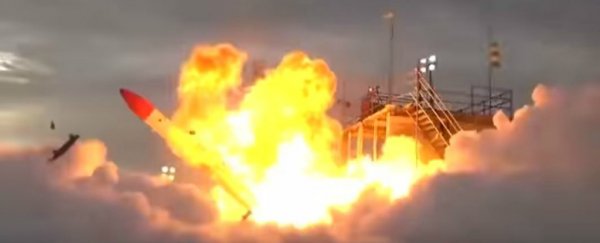Although rocket launches can look effortless and even glamorous, launching things into space is a risky business. And occasionally, it all can go very, very wrong.
A Japanese start-up company learnt this the hard way on June 30, when its rocket MOMO-2 spectacularly crashed back to Earth after spending only a few moments off the launch pad.
Luckily for everyone involved, no one was injured, as the rocket was uncrewed.
The 10-metre (32-foot) rocket was developed by a company called Interstellar Technologies, with the goal to make small, lightweight, and low-cost rockets that can send satellites into space.
This was their second attempt at an inexpensive rocket launch. The first MOMO did manage to leave the launch pad, and was at least a partial success.
Sadly, the video of the latest launch attempt shows MOMO-2 leaving the launch pad, but then crashing back to Earth about six seconds later in a tragically comic fashion.
This isn't great news for the company, whose aim is to put a satellite into low Earth orbit by 2020.

Interstellar Technologies is aiming to spend a fraction of the price of government satellites – according to Engadget, the original MOMO cost US$440,000 vs the Japanese government's US$1.8 million minimum.
Obviously this would be absolutely fantastic, but they have yet to prove their approach to rocket launching actually works well enough to entrust it with the precious payload of a satellite.
This is also pretty bad news for the company's founder, Takafumi Horie, who originally was known as the creator of an internet service provider called Livedoor, but more recently became infamous for spending two years in prison for accounting fraud.
"We have never seen a failure like this," Horie told reporters, according to the Asahi Shimbun. "We are thinking about what we can do to maintain some tie to the next step even as the future remains barely visible."
However, the rest of the company is putting on a brave face, saying that there's no significant damage to the launch facilities.
"We could not accomplish what we were expected to do. I feel sorry for that," said Takahiro Inagawa, the company's president, told the South China Morning Post.
"I feel that I would like to keep giving it a shot."
It seems the "if at first you don't succeed" mantra is still extremely relevant for space launches. Let's just hope it's worth all this effort.
